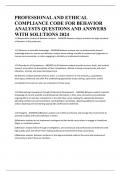PROFESSIONAL AND ETHICAL
COMPLIANCE CODE FOR BEHAVIOR
ANALYSTS QUESTIONS AND ANSWERS
WITH SOLUTIONS 2024
1.0 Responsible Conduct of Behavior Analysts. - ANSWER Behavior analysts maintain the high standards
of behavior of the profession.
1.01 Reliance on Scientific Knowledge. - ANSWER Behavior analysts rely on professionally derived
knowledge based on science and behavior analysis when making scientific or professional judgments in
human service provision, or when engaging in scholarly or professional endeavors
1.02 Boundaries of Competence - ANSWER (a) All behavior analysts provide services, teach, and conduct
research only within the boundaries of their competence, defined as being commensurate with their
education, training, and supervised experience.
(b) Behavior analysts provide services, teach, or conduct research in new areas (e.g., populations,
techniques, behaviors) only after first undertaking appropriate study, training, supervision, and/or
consultation from persons who are competent in those areas.
1.03 Maintaining Competence through Professional Development. - ANSWER Behavior analysts maintain
knowledge of current scientific and professional information in their areas of practice and undertake
ongoing efforts to maintain competence in the skills they use by reading the appropriate literature,
attending conferences and conventions, participating in workshops, obtaining additional coursework,
and/or obtaining and maintaining appropriate professional credentials.
1.04 Integrity. - ANSWER (a)Behavior analysts are truthful and honest and arrange the environment to
promote truthful and honest behavior in others.
(b)Behavior analysts do not implement contingencies that would cause others to engage in fraudulent,
illegal, or unethical conduct.
(c)Behavior analysts follow through on obligations, and contractual and professional commitments with
high quality work and refrain from making professional commitments they cannot keep.
(d)Behavior analysts' behavior conforms to the legal and ethical codes of the social and professional
community of which they are members.
, (e)If behavior analysts' ethical responsibilities conflict with law or any policy of an organization with
which they are affiliated, behavior analysts make known their commitment to this Code and take steps
to resolve the conflict in a responsible manner in accordance with law.
1.05 Professional and Scientific Relationships. - ANSWER (a) Behavior analysts provide behavior-analytic
services only in the context of a defined, professional, or scientific relationship or role.
(b) When behavior analysts provide behavior-analytic services, they use language that is fully
understandable to the recipient of those services while remaining conceptually systematic with the
profession of behavior analysis. They provide appropriate information prior to service delivery about the
nature of such services and appropriate information later about results and conclusions.
(c) Where differences of age, gender, race, culture, ethnicity, national origin, religion, sexual orientation,
disability, language, or socioeconomic status significantly affect behavior analysts' work
concerning particular individuals or groups, behavior analysts obtain the training, experience,
consultation, and/or supervision necessary to ensure the competence of their services, or they make
appropriate referrals.
(d) In their work-related activities, behavior analysts do not engage in discrimination against individuals
or groups based on age, gender, race, culture, ethnicity, national origin, religion, sexual
orientation, disability, language, socioeconomic status, or any basis proscribed by law.
(e) Behavior analysts do not knowingly engage in behavior that is harassing or demeaning to persons
with whom they interact in their work based on factors such as those persons' age, gender, race,
culture, ethnicity, national origin, religion, sexual orientation, disability, language, or socioeconomic
status, in accordance with law.
(f ) Behavior analysts recognize that their personal problems and conflicts may interfere with their
effectiveness. Behavior analysts refrain from providing services when their personal circumstances may
compromise delivering services to the best of their abilities.
1.06 Multiple Relationships and Conflicts of Interest - ANSWER (a) Due to the potentially harmful effects
of multiple relationships, behavior analysts avoid multiple relationships.
(b) Behavior analysts must always be sensitive to the potentially harmful effects of multiple relationships.
If behavior analysts find that, due to unforeseen factors, a multiple relationship has arisen, they seek to
resolve it.
(c) Behavior analysts recognize and inform clients and supervisees about the potential harmful effects of
multiple relationships.
(d) Behavior analysts do not accept any gifts from or give any gifts to clients because this constitutes a
multiple relationship




